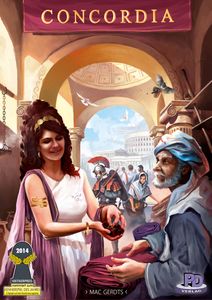In the UK we are enjoying a beautiful, warm, sunny May bank
holiday. We visited Val and Chris for a leisurely al fresco lunch in their
garden, and managed to play a game of Concordia in the afternoon. I’m slightly
surprised that this acclaimed game had not made it to our table before, so was
keen to try it out. It did not disappoint. Essentially it is a trading game set
in the Roman world with players generating trade networks, acquiring and
utilising goods to expand their commercial empires. There are numerous
potential routes to victory. Each player starts with the same hand of action
cards, which they can work through in any order they wish, and to which they
can add to by purchasing further cards from the common bank available to all.
The twist which makes the mechanism really work lies in two key card actions;
the Senator (which allows a player to duplicate another players card), and the
Tribune (which recalls all your played cards back to your hand). Cards also
have a secondary function (the God to which they are dedicated) which can
impact the end-game scoring procedure, and therefore the strategy you may aim
for during the game.

The game play flows nicely once you have got your head
around the different card actions. At the start it feels that only having one
card that allows you to move and build (the Architect) is a bit limiting, but
you soon appreciate the importance of judicious play of the Senator card, which
can overcome such shortcomings. I was surprised at the game length (over 2
hours) considering the speed of card play we achieved, but at no point did the
game feel slow paced or cumbersome. Players face tough decisions during the
game; at points you lack certain key resources, your money supply fluctuates,
you are keen to get access to new regions etc. There is no direct conflict
between players apart from making areas of the board more expensive to get
into, and some of your actions can actually benefit others by providing them
with resources.
When we tallied the points at the end, Val (who had a cloth
monopoly) was the clear winner, whilst I surprisingly was second placed.
Concordia is definitely a game we will happily return to. In fact it has
convinced me to purchase a new game, Transatlantic, by the same designer (Mac
Gerdts) when we visit UKGE in a few weeks. This game uses very similar
mechanics but is set in the Victorian era of steam ships and world trade.
No comments:
Post a Comment